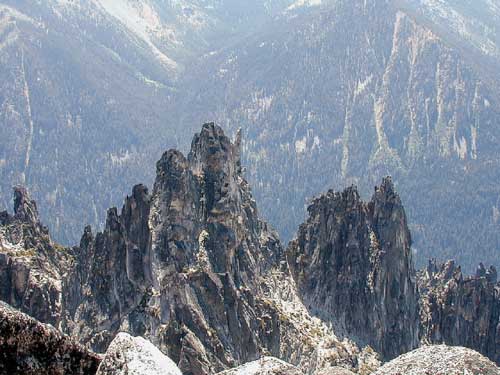may not necessarily be my favorite poet, but I own eleven of his books of poetry, at least six more books than by any other poet.
Maybe I enjoy Wagoner’s poetry because he taught the first English class I ever took at the University of Washington or because he taught the first section of the year-long class I took on modern poetry my senior year.
Maybe it is simply because I was young and impressionable then and, no matter what he was teaching, he was as mesmerizing as Burt Lancaster in The Rainmaker. Anyone who can write lines like:
God bless me? Me be one for the cloud-capped, holy-
For showbiz, smug, sharkskinny, hog-certain, flowery Chosen
Harping for glory? Thumbs-upping glissandos on pure-gold G-strings?
could certainly hold my attention no matter what he was saying.
He saw the world in ways I, having been trapped in institutions, of learning my whole life, had never seen at 18 and 21 years of age.
Today, though, his poems probably appeal to me because they capture feelings associated with our common experiences, particularly those connected with the Northwest outdoors, as in the following poem.

GETTING THERE
You take a final step and, look, suddenly
You’re there. You’ve arrived
At the one place all your drudgery was aimed for:
This common ground
Where you stretch out, pressing your cheek to sandstone.
What did you want
To be? You’ll remember soon. You feel like tinder
Under a burning glass,
A luminous point of change. The sky is pulsing
Against the cracked horizon,
Holding it firm till the arrival of stars
In time with your heartbeats.
Like wind etching rock, you’ve made a lasting impression
On the self you were
By having come all this way through all this welter
Under your own power
Though your traces on a map would make an unpromising
Meandering lifeline.
What have you learned so far? You’ll find out later,
Telling it haltingly
Like a dream, that lost traveller’s dream
Under the last bill
Where through the night you’ll take your time out of mind
To unburden yourself
Of elements along elementary paths
By the break of morning.
You’ve earned this worn-down, hard, incredible sight
Called Here and Now.
Now, what you make of it means everything,
Means starting over:
The life in your hands is neither here nor there
But getting there,
So you’re standing again and breathing, beginning another journey without regret
Forever, being your own unpeaceable kingdom,
The end of endings.
David Wagoner from In Broken Country
Hiking, my metaphor for life, is a spiritual experience that reflects my journey to discovering who I am and who I want to be.
Each hike is an individual journey, and at least for one day all that exists is my goal is to reach the ãend.ä There is no outside world to worry about.
Of course, more than once I’ve wondered why I am doing a particular hike and whether I am ever going to reach the end, particularly on an extended backpack. When I do reach my destination, though, I feel physically and spiritually like “tinder under a burning glass.” That passionate moment justifies all the pain it took to get there. For that moment, there is only “Here and Now.”
As I start back the trail, forgetting the pain and struggle, I begin to think of my return or of my next great hike. And with the help of Wagoner’s poem, I realize that “the life in your hands is neither here nor there but getting there.”

sir
I want your postal address, for sending you my poems, for a critical glance, if possible.
kindly entertain my plea, for which i will ever remain obliged to you.
thanking you.
Amit shankar